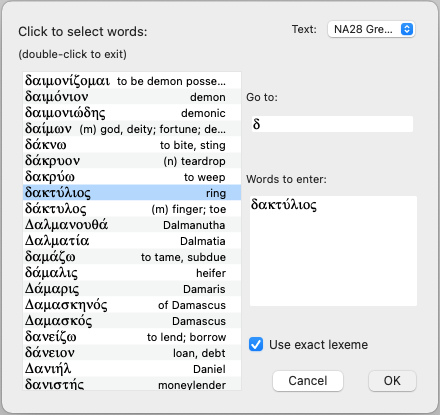Entering Greek Lexical, Inflected, and Root Forms
You can search for the lexical, inflected, and root![]() A root is a unit of a language that cannot be further divided, from which words are derived by modification. The root does not necessarily survive as a word in itself. The Accordance roots may combine homographs and therefore a single root may include roots with different etymologies and meanings. In Hebrew, by convention, the lexical form (lemma) of a verb is the same as the root. forms in Greek tagged texts. When performing a search using a lexical form
A root is a unit of a language that cannot be further divided, from which words are derived by modification. The root does not necessarily survive as a word in itself. The Accordance roots may combine homographs and therefore a single root may include roots with different etymologies and meanings. In Hebrew, by convention, the lexical form (lemma) of a verb is the same as the root. forms in Greek tagged texts. When performing a search using a lexical form![]() The canonical (dictionary) form of a word as the argument, all occurrences of words from that lexical root are found.
The canonical (dictionary) form of a word as the argument, all occurrences of words from that lexical root are found.
The following table summarizes options for entering the lexical form (or lemma![]() The canonical (dictionary) form of a word), inflected form
The canonical (dictionary) form of a word), inflected form![]() The word as it appears in the original text, which may be modified from its base dictionary form, or root form in the Search Entry box with the mouse.
The word as it appears in the original text, which may be modified from its base dictionary form, or root form in the Search Entry box with the mouse.
| Form | Search Menu | Right-Click | Resulting Dialog Box |
|---|---|---|---|
| Lexical (or lemma) | Enter Lexical Forms | Enter>Lemma | Select Lexical Forms |
| Inflected | Enter Inflected Forms | Enter>Inflected | Select Inflected Forms |
| Root | Press Alt+ and choose Enter Root Forms | Enter>Root | Select Root Forms |
|
|
Note The Enter Lexical Forms item changes to Enter Root Forms if |
You can also enter the lexical form (or lemma), inflected form, or root form in the Search Entry box manually. When entering manually, be sure to note the text direction
| Form | How Entered | Example |
|---|---|---|
| Lexical (or lemma) | Type the word |

|
| Exact Lexical Form | Type the word with any pointing, preceded by an equal sign |

|
| Inflected | Type the word in quotation marks |

|
| Exact Inflected Form | Type the word preceded by an equal sign; these are surrounded by quotation marks |

|
| Root | Type the word preceded by a plus sign |

|
The rest of this topic looks at additional considerations when performing a search for Greek lexical, inflected, and root forms.
The Select Lexical Forms dialog box is used to choose the lexical form(s) to enter in the Search Entry box. Available lexical forms are taken from all words in the search text.
- A list of available lexical forms is displayed in the left of the dialog box, together with the matching English gloss
 Short definition of a word.
Short definition of a word. - Three dots (…) at the end of a definition indicates the gloss is too long to be displayed.
If Use exact lexeme![]() A meaningful linguistic unit that is an item in the vocabulary of a language is selected in the Select Lexical Forms dialog box, an equal sign (=) is added before each word in the Search Entry box. This constrains the search to the exact selected form.
A meaningful linguistic unit that is an item in the vocabulary of a language is selected in the Select Lexical Forms dialog box, an equal sign (=) is added before each word in the Search Entry box. This constrains the search to the exact selected form.
In practice, this makes a difference in Greek lemmas only for the few forms which are distinguished by the breathing mark or accent such as  and ει̉ς, ου̉ and
and ει̉ς, ου̉ and  , or τὶ and τί. The dialog box recalls the state of this check box when you close and re-open it, for grammatically tagged texts and for all other texts.
, or τὶ and τί. The dialog box recalls the state of this check box when you close and re-open it, for grammatically tagged texts and for all other texts.
When you perform a search using an inflected form, only occurrences of that specific inflected form are found, that is, the exact same letters as appear in the search argument.
Use the Select Inflected Forms dialog box to choose any word that occurs in the search text. Words added to the search argument via this dialog box are automatically surrounded by quotation marks. Glosses do not appear in this list since they are attached to the lexical rather than the inflected forms.
If the Use exact form is selected in the Select Inflected Form dialog box, an equal sign (=) is placed before each word in the Search Entry box, and the form is entered exactly as selected. This constrains the search to that exact form, as described above.
This type of search is helpful for distinguishing between different accents or breathing marks such as  ,
,  ,
,  ,
,  ,
,  , and
, and  . To find all forms of
. To find all forms of  (one) as distinguished from
(one) as distinguished from  (in) you must search for
(in) you must search for  .
.
If Use exact form is not selected, the word is entered with lowercase letters only.

